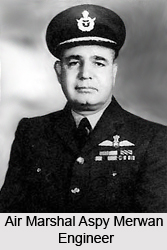 Air Marshal Aspy Merwan Engineer was an officer in the Indian Air Force. He rose through the ranks to become independent India"s second Chief of the Air Staff in 1960. He was also awarded Distinguished Flying Cross (DFC). His flying career began in 1930 at the age of 17 years, when as a co-pilot he accompanied his friend R. N. Chawla to Croydon Airport, London, from Karachi British India, by flight and were the first Indians to do so.
Air Marshal Aspy Merwan Engineer was an officer in the Indian Air Force. He rose through the ranks to become independent India"s second Chief of the Air Staff in 1960. He was also awarded Distinguished Flying Cross (DFC). His flying career began in 1930 at the age of 17 years, when as a co-pilot he accompanied his friend R. N. Chawla to Croydon Airport, London, from Karachi British India, by flight and were the first Indians to do so.
Early Life of Air Marshal Aspy Merwan Engineer
Aspy Merwan Engineer was born on 15th December in the year 1912. At the age of 17 years, Engineer received the Agha Khan Trophy, as the first Indian to fly from London to Delhi in a Gypsy Moth. He was the youngest Indian pilot at that time. He was selected for the Empire Pilot training course at Royal Air Force, Cranwell.
Career of Air Marshal Aspy Merwan Engineer
After completing the training, he joined `A` Flight of the Indian Air Force. During this time he flew the Wapitis in the North Western Frontier Province. In 1938 he was posted to the newly formed No.1 Squadron. Aspy Merwan Engineer served as the flight commander of `A` Flight of No.1 Squadron, which was involved in the air strikes of North Waziristan. In 1939 his squadron, attained an exceptional achievement of carrying out 403 hours of flying operations. Aspy Merwan Engineer was the first Indian Air Force officer to be Mentioned-in-Despatches for his distinguished performance in the battle against the Tribals of Indo-Afghan border. In 1941 Aspy Merwan Engineer was appointed to the No.2 Squadron at Peshawar. Three months later, he was made "Commander" of this squadron. He led several flying operations in the Tochi Valley and Miranshah. In 1942 he became the second pilot of Indian Air Force to be awarded as the “Distinguished Flying Crossâ€, after Jumbo Majumdar.
After Independence, Aspy Merwan Engineer led the Kashmir Operations as "Group Captain" and subsequently rose to the rank of "Air Commodore". He commanded the No.1 Operational Group and later took over the charge of Personnel and Administration. After that, Aspy Merwan Engineer was appointed to the Hindustan Aeronautics Limited. From 1958 to 1960 he served as the Managing Director of Hindustan Aeronautics Limited. At that time, Hindustan Aeronautics Limited played crucial role for developing Indian Aeronautics industry and designing indigenous fighter plane like the Marut.
After the unexpected death of Air Marshal Subroto Mukherjee, Aspy Merwan Engineer was appointed as the "Chief of Air Staff" on 1st December, 1960. During his tenure as Chief of Air Staff, Indian Air Force successfully carried out the Goa Operations and actions against the Katanganese in Kongo. After the war against China, Air Marshal Aspy Merwan Engineer became the supervisor of the infrastructure related development of Indian Air Force.
Later Life of Air Marshal Aspy Merwan Engineer
After retirement from the Indian Air Force, Air Marshal Aspy Merwan Engineer was sent to Iran as Indian ambassador. Around 1990, he moved to Southern California where he founded the California Zoroastrian Center. Air Marshal Aspy Merwan Engineer died in 2002.




















